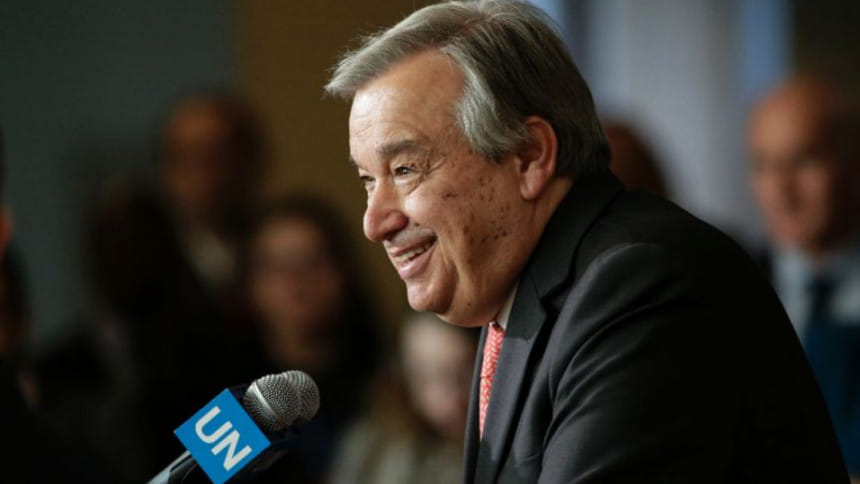Antonio Guterres - The next UN Secretary General

The hunt for a successor to Ban Ki-moon has come an end at Turtle Bay, New York. Ban Ki-moon completes his second five-year term by the end of December 2016. As the 71st General Assembly went into session, UN corridors were abuzz with three issues – transparency in the selection process of Secretary General, selection of a woman Secretary General and reform of the United Nations, which has 193 member states, some 30 agencies and programmes, and 41,000 staff.
In the 71-year history of the United Nations, four out of five geographical groups held the Secretary General's post. Western Europe had three Secretary Generals (Trygve Lie, Dag Hammarskjold and Kurt Waldheim), Latin America had one (Javier Perez de Cuellar), Africa had two (Boutros Boutros-Ghali and Kofi Annan), Asia-Pacific had two (U Thant and Ban Ki-moon). This time around it was Eastern Europe's turn - in diplomatic jargon, it was 'Buggins' turn'.
Since the 2015 General Assembly, there have been loud campaigns from NGOs, civil societies and women activists that the next Secretary General should be a woman. There were 13 candidates, seven of whom were women, mostly from Eastern Europe. Three, of course, dropped out later for lack of support.
The election (or rather selection) of Secretary General has always been shrouded in secrecy. Mogens Lykketoft, President of the 70th General Assembly tried to make the nomination process transparent. In April 2016, he organised a "job interview" and a televised "debate" for the candidates in the General Assembly. Interestingly, candidates were often asked the embarrassing question whether they wanted to be a "Secretary" or a "General".
United Nations' responsibilities have increased manifold today with fast changing technology, communication, commerce and ecology that link nation states into a global village. The world is also faced with multiple intractable challenges – the Syrian war, terrorism, refugees, human rights violations, the Palestine issue, ISIS, threat to Europe's security due to Brexit, an assertive China, a resurgent Russia, uncertainty of US election results, and lately the India-Pakistan conflict, etc. Geopolitical schism between the West and East is more pronounced now than a couple of decades ago. Conflicts and threats of war are fast changing the world order.
The world body has been widely criticised for being toothless and dysfunctional – unable to stop or resolve conflicts around the world. Frustrations with the UN led nations includes the concern to form separate groups to address security and economic issues facing the world – G7, G20, BRICS, etc. The outgoing underwhelming Ban Ki-Moon has been described as timid, uninspiring and lacking appeal. During his ten years as Secretary General, he had hardly come up with new ideas which could rally support from P5 and other members.
This brings the issue of reform of the UN system to the fore. The noteworthy idea put forth by the civil society, 1 For 7 Billion, is a single seven-year non-renewable term for the Secretary General. This will free the Secretary General from seeking renewal and make him or her more independent and assertive.
The other proposal for reform of the Security Council relates to curtailing the use of veto by P5 members. In other words, amend the UN Charter and make it competent to handle contemporary challenges. But despite lots of research and discussions, the P5 had nothing to do with it. The P5 members consider 'veto power' their inalienable right. In fact, the P5 members are largely to blame for UN's ineffectiveness.
In choosing the new UN boss, the Security Council members used straw polls, a novel winnowing process. The 15 members indicated behind closed doors whether they "encourage", "discourage" or have "no opinion" of a candidate. The process persuaded repeatedly 'discouraged' some aspirants to quit the race. So far, the Security Council has had six straw polls – the last one on October 5, 2016.
Among the ten remaining candidates, only Antonio Guterres came out on the top. He secured 13 "encouraged" votes, no member "discouraged" him while two members had "no opinion". The nine other aspirants all had "discouraged" votes. Thus, Antonio Manuel de Oliveira Guterres (67), member of Socialist International, former Prime Minister of Portugal (1995-2002), who also served as chief of United Nations High Commissioner for Refugees (2005 – 2015), was selected to lead the United Nations. All veto-wielding P5 members openly supported Guterres. Since no member discouraged Guterres, his name was formally forwarded to the General Assembly for endorsement. The attempt to get the Security Council to nominate two candidates did not find takers. One wonders whether the process is actually democratic.
It would have been great to have a woman leading the world body, but is it necessarily a gender issue? Actually, the issue has been about appointing someone with courage of conviction, integrity and competence. After winning the Security Council's unanimous support, Guterres pledged to revamp the United Nations to boost its peace-making efforts and promote human rights.
In January 2017, Antonio Guterres will land at the high-profile bully pulpit of the United Nations as its ninth Secretary General. Given his long experience in the UN system, Guterres should be able to manoeuvre the difficult corridors of the diplomats' super bowl skilfully. One only wonders will he be a "Secretary" or a "General" or both?
The writer is former Ambassador and Secretary.

 For all latest news, follow The Daily Star's Google News channel.
For all latest news, follow The Daily Star's Google News channel. 






Comments